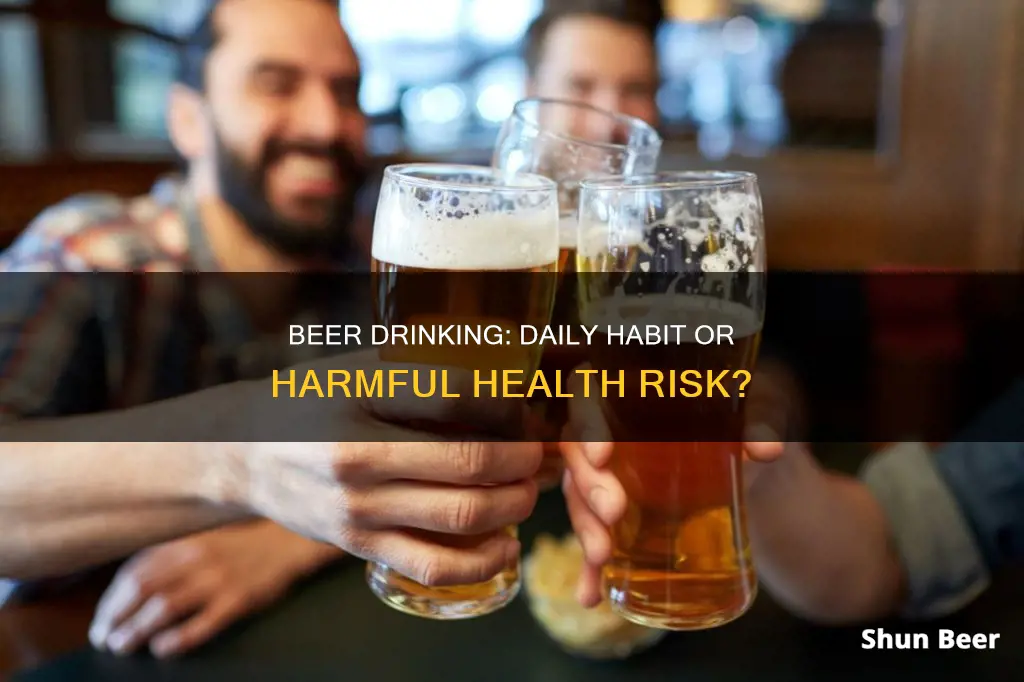
Beer is a popular alcoholic beverage made from cereal grains, yeast, hops, and other flavouring agents. It is often viewed as empty calories, but beer does contain some vitamins and minerals, including B vitamins, potassium, calcium, thiamine, iron, and zinc.
The health effects of drinking beer are mixed. Drinking one or two standard beers per day may have some positive effects, such as benefits to heart health, blood sugar control, bone density, and reduced dementia risk. However, heavy and binge drinking is associated with a higher risk of early death, alcohol dependence, depression, liver disease, weight gain, and cancers.
It is important to note that the potential benefits of drinking beer are related to light to moderate intake only. In the United States, a standard drink contains approximately 14 grams of pure alcohol, which is the amount typically found in 12 ounces (355 mL) of regular beer, 5 ounces (150 mL) of wine, or 1.5 ounces (45 mL) of spirit.
| Characteristics | Values |
|---|---|
| Positive effects | Positive effects of drinking one or two standard beers per day (12 ounces or 355 mL) |
| --- | --- |
| Heart | May benefit your heart |
| Bones | May aid bone density |
| Blood sugars | May improve blood sugar control |
| Dementia risk | May lower dementia risk |
| Negative effects | Negative effects of drinking too much alcohol |
| --- | --- |
| Death | Increased risk of death |
| Alcohol dependence | Alcohol dependence |
| Depression | Increased risk of depression |
| Liver disease | Liver disease |
| Weight gain | Weight gain |
| Cancers | Cancers |
What You'll Learn

Weight gain and obesity
Beer contains empty calories, and drinking too much of it can lead to weight gain and obesity. Excessive beer consumption can also increase the risk of heart disease, liver disease, and alcohol dependency.
Beer is made from cereal grains and yeast, and it contains some B vitamins and minerals. However, it is not a good source of these nutrients compared to whole foods like fruits and vegetables.
According to the USDA, one 12-ounce can (355 mL) of regular beer contains 153 calories. Consuming multiple drinks can contribute to weight gain.
A study by Fresán et al. found that substituting one beer with one serving of water per day was related to a lower incidence of obesity.
Another study by Schütze et al. suggested that only men observed a risk for an increase in waist circumference with beer consumption of more than 500 mL/day. In women, beer-abstainers showed lower relative odds for waist circumference gain compared with their very low-level drinking counterparts (1 to <125 mL/day).
In conclusion, moderate beer consumption of up to 196 g/week (approximately 1–2 beers per day) for men and 112 g/week (approximately 1 beer per day) for women may be considered safe and even provide some health benefits. However, it is important to note that these values are upper limits and that excessive or binge drinking can lead to serious health issues.
Beer Options for Diabetics: What's Safe to Drink?
You may want to see also

Heart disease
Drinking beer every day can have a negative impact on your health, and this includes an increased risk of heart disease.
Beer is often seen as a better option than other alcoholic drinks due to its low alcohol by volume (ABV). Many beers are under 5% ABV, but drinking a beer every day can still be detrimental to your health in the long term.
Drinking moderate amounts of alcohol, including beer, has been linked to a reduced risk of developing heart disease in otherwise healthy people. However, the term "moderate amounts" is not clearly defined. One source defines moderate drinking as one drink per day for women and one or two drinks per day for men. Another source defines it as one to four alcoholic drinks per day for people aged 65 and older.
Beer contains minerals such as magnesium, potassium, selenium, and B vitamins, as well as antioxidants from hops. These antioxidants may be the reason why some studies have shown an association between moderate alcohol intake and a lower risk of dying from heart disease. However, it is hard to determine cause and effect in these studies, as other factors such as income, education, and diet may also play a role.
Drinking beer every day can affect your overall health in several ways:
- It can disrupt your sleep, even if you only consume a light amount during the day.
- It can slow down your weight-loss process as the liver prioritises getting rid of alcohol over burning fat.
- It can cause digestive issues such as abdominal pain, bloating, and diarrhoea.
- It can contribute to dehydration as it disrupts hormones that affect kidney function.
- It can increase your risk of chronic diseases such as high blood pressure, stroke, and heart failure.
- It can increase your risk of certain types of cancer, including mouth, throat, liver, and breast cancer.
In conclusion, while drinking moderate amounts of beer may have some potential health benefits, such as improved heart health and increased bone density, the risks of drinking beer every day outweigh the benefits. It is important to consume alcohol in moderation and responsibly, following guidelines that recommend limiting daily intake to two drinks or less for men and one drink or less for women.
Drinking Beer on Key West's Sidewalks: What's Allowed?
You may want to see also

Liver disease
Alcohol-related liver disease (ARLD) is caused by heavy alcohol use and is common but preventable. The liver is a complex organ with many functions, including filtering toxins from the blood, producing bile to help break down fats during digestion, and regulating blood sugar and cholesterol levels. When the liver filters alcohol, some of its cells die, and while it can develop new cells, prolonged alcohol misuse over many years can reduce its ability to regenerate, leading to serious and permanent liver damage.
There are three main stages of ARLD: alcoholic fatty liver disease, alcoholic hepatitis, and cirrhosis. Alcoholic fatty liver disease is the first stage of ARLD and is characterised by a build-up of fats in the liver. This stage rarely causes any symptoms but is an important warning sign that an individual is drinking at a harmful level. Alcoholic hepatitis is a potentially serious condition that can occur from alcohol misuse over a longer period or from binge drinking. Mild alcoholic hepatitis is usually reversible if the individual stops drinking permanently, but severe alcoholic hepatitis is often life-threatening. Cirrhosis is a stage of ARLD where the liver has become significantly scarred, and this stage is generally not reversible. However, stopping drinking alcohol immediately can prevent further damage and increase life expectancy.
The treatment for ARLD is to stop drinking alcohol, preferably for the rest of the individual's life. This gives the liver the best chance of recovering. If the individual is dependent on alcohol, stopping drinking can be difficult, but support, advice, and medical treatment may be available through local alcohol addiction support services. In severe cases where the liver has stopped functioning and does not improve when the individual stops drinking, a liver transplant may be required.
Heavy alcohol use is defined as consuming more than the liver can process, and as of 2023, the National Institutes of Health define this as consuming more than 14 units of alcohol per week. A unit of alcohol is equal to about half a pint of normal-strength lager or a pub measure (25ml) of spirits.
Beer and Broken Ribs: Is It Safe to Drink?
You may want to see also

Alcohol dependency
People with alcohol dependency find they need to drink more to get the same effect and often prioritise drinking over other activities or obligations, such as work or family life. They may also continue drinking despite harmful consequences, such as liver disease or depression. Alcohol dependency can also cause physical withdrawal symptoms, including shaking, sweating, and nausea, when a person's blood alcohol level drops. As such, it can be dangerous to stop drinking completely or too quickly without medical support.
The risk of developing health problems increases the more a person drinks regularly. Alcohol dependency is likely to increase the risk of cancers of the mouth, throat, and breast, as well as other serious medical conditions, including bowel cancer, breast cancer, pancreatitis, high blood pressure, stroke, and coronary alcohol-related heart disease. Alcohol dependency can also negatively impact mental health, with anxiety, depression, and suicidal feelings all linked to regular, heavy drinking.
To reduce the risk of becoming alcohol-dependent, it is important to take regular breaks from drinking and to not exceed recommended drinking limits. The UK Chief Medical Officers advise that, to keep health risks from alcohol low, it is safest not to drink more than 14 units a week on a regular basis. If drinking around 14 units per week, it is recommended to have three or more drink-free days each week.
Beer and Passover: What's Allowed?
You may want to see also

Sleep disruption
Drinking beer, even in light amounts, can disrupt your sleep. Alcohol affects the brain's communication pathway and its ability to process information. This can impair your reflexes, balance, memory, and sleep.
A 2018 study published in JMIR Mental Health found that even light drinkers (defined as drinking two or fewer servings for men, and one or fewer for women) experienced a 9.3% decrease in sleep quality. When you consume alcohol, your liver metabolizes it, which can result in a fitful night of sleep.
According to Kimberly Gomer, M.S., RD, LDN, "The alcohol in beer can affect the brain so that reflexes are slowed down, and [your] balance, memory and sleep may be impaired."
Beer and Steroids: Mixing Alcohol with Performance-Enhancing Drugs
You may want to see also
Frequently asked questions
Excessive beer drinking can cause immediate health effects such as trouble controlling emotions, mishaps such as motor vehicle accidents, falls, drownings, and burns, violent activities including homicide, suicide, and sexual assault, alcohol poisoning, and risky sexual behaviours.
Consuming three or more drinks a day is associated with an increased risk of hypertension, hemorrhagic stroke, weakening of the immune system, learning and memory problems, job-related problems, and alcohol use disorders.
The recommended amount of beer to drink per day is one drink for women and two drinks for men.







